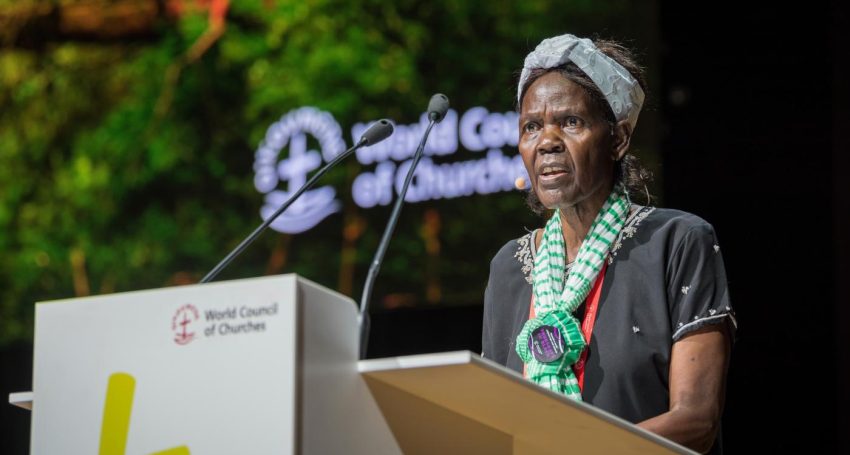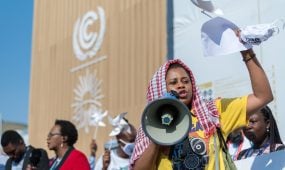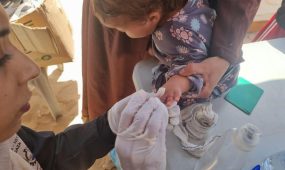Peace pilgrim Agnes Abuom dies at 73
International
Beloved ecumenical leader and indefatigable peacemaker Dr Agnes Abuom has died at the age of 73 in Kenya, following a short illness

An Anglican layperson, Abuom in 2013 became the first woman and the first African to serve as moderator of the World Council of Churches (WCC) central committee, when she was elected by acclamation at the WCC 10th Assembly in Busan, Republic of Korea. She served until the WCC 11th Assembly in September 2022, held in Karlsruhe, Germany. Abuom was the president for the WCC from 1999 to 2006.
Abuom was succeeded as WCC moderator of the central committee in September 2022 by Bishop Heinrich Bedford-Strohm, who commented, “After getting this sad news, I just watched her last video on the WCC homepage, which is something like her legacy for us as the new leadership. It was very moving for me to hear her speak. She says: ‘It is not winter but summer with green and fruit, although threatened. On the journey someone was called home, but that is part of the pilgrimage. We lose people, others get named and continue…”
Bedford-Strohm said: “I will always hold her in loving memory. It is sad to lose her so soon after the end of her service to WCC. I am glad she still experienced the honor of being named as an Anglican canon. We will miss her love, her wisdom, her kindness, her confidence, her inspiration. She is now leaning in the everlasting arms.”
Said Rev. Prof. Dr Jerry Pillay, whose term as WCC general secretary began in January of this year, “The WCC mourns the loss of its immediate past moderator, Dr Agnes Abuom, who passed away on 31 May after a brief illness. She was a woman of humble spirit, great compassion and steadfast faith. Though small in frame yet she possessed the energy, strength and vision for leadership far beyond the reach of many people her age.”
Pillay added “Her wisdom, patience, ability to listen, sensitivity and firmness all gave her the qualities of a dynamic and wise leader. The WCC was blessed to have her serve for many years in the ecumenical movement and then in the past 8 years as moderator of the central committee. Her passion for Christian unity, justice and peace are what prompted her to give sacrificial and untiring service to the WCC. We will always remember her with joy and thanksgiving. “Blessed are those who die in the Lord, they shall live forever.”
Advertisement
Pillay concluded “May the presence and power of the Holy Spirit bring comfort, counsel, peace, love, strength and hope to Agnes’ family, friends, church and all those who knew and loved her in the WCC and beyond. May God’s grace be sufficient for you all.”
Bishop Mary Ann Swenson, former vice moderator of the WCC central committee, said Abuom was a blessing. “I remember our first time together in Geneva in December 2013,” said Swenson. “She took me to the service for Saint Lucia at the Anglican Church near our hotel, and I learned about Agnes’ years in Sweden. Today we honor Saint Agnes. I will miss her every day for the rest of my life. She was a remarkable leader. For us to walk side-by-side for nine years in our Pilgrimage of Justice and Peace was the crowning journey of my lifetime. Thanks be to God for the life and witness of this amazing woman.”
The Most Revd. Dr Olav Fykse Tveit, presiding bishop of the Church of Norway, and former WCC general secretary from 2010-2020, said Abuom was one of the great personalities and leaders in the global Christian family of our time. “The years we worked together, leading the work of the World Council of Churches, will remain precious memories and moments of blessings that I will treasure forever,” said Tveit. “Dr Agnes was a daughter of Africa, extremely gifted and empowered by God to raise the great issues of unity among people and among the churches in the whole world.”
Advertisement
Tveit reflected on Abuom’s wisdom, passion, and spirituality, built on her faith and costly experiences. “Dr Agnes was a champion for true Christian unity, a unity in faith, hope, and love, with justice and peace for all,” he said. “She led our joint struggle in the ecumenical movement for unity, peace, and justice around the world with compassion and professional competence, embedded in a deep and profound spirituality: ‘Let us pray! Please, lead us in prayer!’—so she always started and concluded any session of work.”
Tveit added that Abuom encouraged people to use their gifts and time to serve God in the callings given to them by the churches. “She conveyed this in a personal way to me and others, encouraging and challenging us to be courageous and faithful in our calling,” said Tveit. “As she was leading the World Council of Churches, but also in many other tasks that she accepted, she has given us a unique model of leadership and discipleship.”
Abuom was a particularly profound inspiration for women and lay leadership in the church, concluded Tveit. “As God has now called her to eternal rest, I offer my thanks to the Triune God for granting me the gift to know and work together with this great women, our beloved sister, Dr Agnes Abuom.”
Abuom’s final years as moderator were marked by the changes wrought by the COVID-19 pandemic and by her work with the acting general secretary, Rev. Prof. Dr Ioan Sauca. “I am so proud of our work together,” he said. “Despite the suffering and death caused by the virus, Agnes clearly saw the pandemic as a defining pastoral challenge for the churches to accompany those in pain, to console those in grief, to demand healthcare for the afflicted, and to innovate in sharing the gifts of a truly global ecumenical spirituality.”
Sauca added: “I am devastated; she was for me not only a moderator but a holy woman; she lived her faith in everything she did. We have to be grateful to God for the great gift He gave to us in the person of Agnes. She will be greatly missed.”
Rudelmar Bueno de Faria, general secretary of the ACT Alliance, expressed his sadness. “Agnes’ commitment to the ecumenical world was truly without peer, and her loss will be felt around the world,” he said. “Agnes’ support of ecumenism was well appreciated by the ACT Alliance, and her support of the ecumenical diakonia of churches was an important part of her ministry.”
Dr Theodora Issa of the Syrian Orthodox Patriarchate of Antioch and All the East expressed extreme sadness. “This sudden departure of Agnes came as a shock, and I am truly lost for words as I read the news on the WCC website,” she said. “Agnes was always passionate and compassionate with great patience especially during heated debates, whereas she always searched and spotted the common points and built on them to reach the ultimate consensus.”
Metropolitan Prof. Dr Nifon of Targoviste, Romanian Orthodox Church, paid tribute to Abuom’s life as a respected and loved global church leader.
“She was an excellent companion full of kindness and wisdom,” he said. “We worked together in the leadership of the WCC central committee and the WCC 11th Assembly in harmony and splendid cooperation. We are sure now that her spirit is always present with us. We all should offer now thanksgiving prayers for her life and work and preserve her memory.”
Prof. Dr Isabel Apawo Phiri celebrated Abuom for being a role model for African women leading the ecumenical movement.
“She served the ecumenical movement with passion, dedication, humility, and prayer,” said Phiri. “During difficult times in the WCC, she used to mobilise her close prayer partners to stand in prayer with her. She has run her race and passed on the baton of ecumenical leadership. Her legacy will live for a very long time. May she rest in eternal peace.”
Rev. Prof. Dr h.c. Cornelia Füllkrug-Weitzel, former president of Brot für die Welt and Diakonie Katastrophenhilfe, described Abuom as a gift from God to the whole ecumenical family—especially to women.
“A role model for female leadership, encouraging, inspiring, empowering younger women, giving space to them, helping them to find their way and place in very male dominated churches—may her passionate seeking and speaking the truth, her prophetic vision, her service to the poor as central parts of her faithful discipleship guide us on our own ways!” said Füllkrug-Weitzel. “Thanks be to God for this gift!”
Br Guido Dotti from the Monastic Community of Bose, Italy, gave thanks to the Lord for the gift of Abuom. “I recall with gratitude the moments of sharing during the various stages of our Pilgrimage of Justice and Peace, especially the last Pilgrim Team Visit in Palermo, Lampedusa, and Rome,” he said. “Agnes now contemplates the face of the One she sought so much. May her example be a strong reminder for us to follow the Risen Lord together.”
Rev. Dr Walter Altmann, former moderator of the WCC central committee, said he received the news of Abuom’s death with great consternation. “She was a very faithful servant of God and extraordinarily committed to the ecumenical movement,” said Altmann. “In particular, she dedicated her voluntary services, always competent, even with great personal sacrifices, to the WCC.”
Altmann also noted that Abuom was a layperson with a high theological and pastoral sense to the issues at stake, especially when controversial. He recalled when she became the first female person to be elected moderator of the WCC central committee, “a truly remarkable event in the life of this ecumenical organization,” said Altmann. “I remember the occasion in Busan (2013), when she approached me, still somewhat reluctant to accept the challenge many were asking her to accept. I was so thankful when she finally did so. Now she rests in the heavenly home and we continue our pilgrimage, deeply thankful for her witness.”
The Evangelical Church in Germany mourned the loss, with the chair of the council, Annette Kurschus, recalling Abuom’s service at the 11th WCC Assembly in Karlsruhe. “It was thanks to her tireless efforts and her leadership, which was as strong as it was sensitive, that this gathering could be prepared and finally carried out during the pandemic,” said Kurschus. “With the abundance of topics and questions, she managed to keep the ecumenical movement together in the common search and action for justice and peace in the world.”
Evangelical Church in Germany Bishop Petra Bosse-Huber recognized Abuom as one of the formative women for the ecumenical movement. “Agnes Abuom is one of those women whose face has decisively shaped the global ecumenical movement. She was a daughter of Africa. For me she was like a sister in the central committee of the WCC for many years; younger people might say she is a mother of the ecumenical movement,” Bosse-Huber said. “In any case, she has been a particular inspiration for younger adults, encouraging them to use their gifts and abilities in the ecumenical movement. We connect with all who are remembering Agnes Abuom around the globe these days, saddened and infinitely grateful for all that God has done through her for the communion of churches.”
The Christian Council of Sweden expressed deep sadness. “As the first female and first African moderator of the World Council of Churches, she made a tremendous impact on revitalizing the global ecumenical movement,” wrote the Christian Council of Sweden. “We have lost a remarkable role model and leader in the ecumenical community.”
Secretary general of the Anglican Communion, Bishop Anthony Poggo, also paid tribute to Abuom’s life and her contributions. “Dr Abuom was a passionate ecumenist and peacemaker, and her ministry took her all over the world,” wrote Poggo. “Anglicans mourn the death of Dr Agnes Abuom and give thanks to God for her outstanding and exemplary leadership within the Anglican Church of Kenya, the Anglican Communion, and in the ecumenical movement and the World Council of Churches.”
Lutheran World Federation general secretary Rev. Dr Anne Burghardt also mourned the death of Abuom. “Dr Abuom made history as the first woman and first African in the role of WCC moderator. She was a humble, committed and visionary leader, who offered an excellent example of servant leadership to Christians around the world.”
His Holiness Aram I, Catholicos, Armenian Church Holy See Cilicia, Antelias, Lebanon wrote a tribute to Abuom. “We pray and remember Agnes Abuom, and share our reflections and experiences on her ecumenical journey,” he wrote. “She continued her long and hard journey, giving all her commitment to her Christian faith, the ecumenical movement and Africa.”
A message from the archbishop of the Anglican Church of Kenya expressed deep sorrow. “Her life has impacted so many ecumenists worldwide and she leaves behind a rich legacy of humble, tested, thoughtful, and committed leaders,” the message reads. “She never shied away from expressing what she believed was the right approach to building strong national, regional, and global institutions.”
Rabbi David Fox Sandmel, chair of the International Jewish Committee for Interreligious Consultations, said he was saddened to learn of the passing of Abuom. “I got to know Agnes well as an interfaith observer to the Pilgrimage of Justice and Peace; she was an amazing woman. I will remember her intelligence, her wisdom, her unshakable moral compass, her quiet strength, and her electric smile,” he said. “May her memory be a blessing.”
Most Rev. Dr Martin Modéus, Archbishop of Uppsala, Church of Sweden, offered his deepest condolences. “Dr Abuom’s bond to Sweden and the Church of Sweden was tight – from the time of her studies to visits in later years,” he wrote. “She had many friends in Sweden, in churches, Christian organizations and in academia.”
Anne Glynn-Mackoul, Greek Orthodox Patriarchate of Antioch and All the East (USA), said the loss is devastating. “The wave of sadness that has encircled the globe is testimony to the deep impression Agnes has left in her wake,” said Glynn-Mackoul. “Her immense gifts for building bridges, finding common ground, listening, and encouraging served the WCC and all of us who worked under her leadership during the past challenging years.”
Glynn-Mackoul also commended Abuom’s efforts leading to the adoption of consensus decision making. She was a remarkable person who has left an indelible mark in the world. Personally, I will remember her joy, her mischievous humor, her patience, her encouragement, her grace, and will miss her terribly.”
Anjeline Okola, programme coordinator for the WCC Ecumenical Disability Advocacy Network, reflected that this is a heavy loss to the ecumenical family. “Mama Agnes’ legacy as the first woman moderator of WCC central committee from Africa and how she steered it was something that filled us with pride,” said Okola. “But she was local, too, through her involvement in many nationwide interfaith peace initiatives, some of which she invited me along or asked me to represent her in. Mama Agnes you mentored, encouraged, and paved passageways for many. As you enter eternal rest, thank you.”
The National Council of Churches in Korea expressed its deepest condolences.
“In particular, as the first woman and the first African to serve as moderator of the WCC central committee, she led the international ecumenical community on the Pilgrimage of Justice and Peace and demonstrated deep spiritual leadership amid the crises of COVID-19 and church division,” stated the National Council of Churches in Korea. “This greatly contributed to the fulfillment of Christ’s prophetic mission and accompaniment of the church community in each region with a relationship of heartfelt cooperation, and will be recorded as a great achievement and legacy of the ecumenical movement.”
The Evangelical Church in Hessen and Nassau, Germany, remembered Abuom as an outstanding personality who fought for gender equality, social justice, and peace. “She was a driving force for change and inspired people around the world with her commitment and vision,” the church stated. “Her death leaves a huge gap in the ecumenical movement. However, her memory will serve as a source of inspiration and motivate those who have been influenced by her legacy to continue her work.”
Dr Marcelo Schneider, WCC communication officer, said: “Dr Agnes’ vision for the WCC, deeply rooted in the primary mandate of unity, and her determined commitment to justice and peace, have shaped our hearts and minds over the last decades. Having witnessed her leading so many gatherings of WCC governing bodies, I saw how crucial her style of headship was for the Council, especially over the very challenging past three years and during our 11th assembly. She never left people behind in the ecumenical pilgrimage. And through her words and deeds, there was always more space to welcome others to join. May her legacy echo loudly on all levels of the WCC fellowship.”
H.H. Moran Mor Ignatius Aphrem II, Patriarch of Antioch and all the East, the Supreme Head of the Universal Syriac Orthodox Church, commemorated Abuom as an eminent ecumenical leader.
“We met together during several meetings of the WCC: she was a humble servant of the Lord who became an example to others with her strong character as well as her kindness and vision,” wrote the Patriarch. “May God comfort the hearts of those who mourn her, grant rest to her soul and shine upon her with the divine light of His resurrection.”
Rev. Dr Jooseop Keum, general secretary of the Council for World Mission, expressed great sadness. “Her passing is an immense loss to the global ecumenical movement, where she played an extraordinary role as a visionary leader and a steadfast advocate for justice and peace,” he said. “She dedicated her life to promoting unity, mission, and reconciliation through the ecumenical movement.”
The Christian Council of Norway commemorated Abuom as one of the truly great ecumenists. “She was a person with a big and warm heart, and was so central and important in the service of peace and reconciliation,” said Christian Council of Norway secretary general Erhard Hermansen. “We thank God for everything Agnes Abuom has meant to so many and pray for her good memory.”
The Sudanese Council of Churches presented itself to the family of the WCC, extending condolences to the family of Abuom. “May her soul rest in peace with Christ, that is better,” reads the message.
Rev. Prof. Dr David Emmanuel Goatley, faculty director of the Office of Black Church Studies, Duke University Divinity School, North Carolina, US, expressed thanks for the life and legacy of Abuom. “She was a champion for Thursdays in Black—the global campaign for a world without rape and sexual violence—and strove for Christian unity asserting: ‘There is room in the gospel for disagreement but there is no room for disengagement.’ ”
A child of the movement
Abuom’s ecumenical journey began long before her election as moderator.
Born in northwest Kenya in 1949 to a family with four brothers, Abuom’s ecumenical roots ran deep, with Protestant, Catholic, Anglican, and Pentecostal family members and early childhood education in missionary schools. Her political engagement also emerged early and unerring, going back to her student days at the University of Nairobi, when her Christian activism led her to exile and, later, imprisonment.
“My faith journey is rather interesting,” she told an interviewer in 2009. “I was coming of age in the time of leftist thinking, and to combine leftist thinking and faith was not easy. The churches were often uneasy with socialism and many in the leftist political movements rejected religion. But I was able nonetheless to combine my leftist sense of justice and my faith. Later on, I found that they strengthened each other. My ideas about social justice were very much informed and strengthened by my faith. In this I was inspired by and drew strength from the example of my grandmother, the faith leader, who broke through ethnic and cultural barriers, refusing female genital mutilation and moving in new directions.”
Abuom became involved with the World Council of Churches when the WCC’s assembly was held in Nairobi in 1975. She also was involved in student organizations and politics – the latter causing controversies that led her to leave Kenya for Sweden in 1975. There she learned Swedish and earned a degree in education. After two years as a youth worker for the WCC in Geneva, she returned to Sweden and earned a doctorate in missiology with a thesis on “The Role of Non-Governmental Organizations in Development.” She worked in the WCC Youth Sub-Unit in the 1980s and later worked with refugee issues for the WCC in Sudan, and worked for two years in Zimbabwe as a tutor.
Returning to Kenya in 1989, Abuom was imprisoned for her opposition to President Daniel Arap Moi. She then went on to work for the Anglican Church of Kenya, mostly with national development issues, and from 1991 with a civic education program.
Abuom’s husband, Wilfred, passed away in 2014.
Agnes Abuom served three consecutive terms on the central committee, first as a WCC president (1998-2006), then as a member (2006-2013) moderating the of the policy reference committee, then as moderator of the central committee (2013-2022). Her first WCC assembly was Nairobi (1975). She was a delegate of the Anglican Church of Kenya at the Harare (1998), Porto Alegre (2006), Busan (2013) and Karlsruhe (2022) assemblies. She served as moderator of the public issues committee in Porto Alegre, moderator of the policy reference committee in Busan and moderator of the assembly in Karlsruhe. She was also a member of the Special Commission on Orthodox Participation in the WCC and the Permanent Committee on Consensus and Collaboration.
She had also been a development consultant serving both Kenyan and international organizations and coordinating social action programmes for religious and civil society, especially in the Horn of Africa, establishing her own agency, TAABCO Research and Development Consultants, in 1997.
Abuom was also closely associated with the All Africa Conference of Churches, the National Council of Churches of Kenya, and WCC member churches in Africa, as well as Religions for Peace.
Given such commitments, for Abuom, creative, practical engagement with migrants, abuse survivors, or victims of violence also means reframing the practice of ecumenism. “The witness of many in the forefront of struggles demands that we move away from the culture of conferences and statements and begin to get engaged in actions that nurture hope and alternatives,” she told the central committee in 2016. “There is room in the gospel for disagreement but there is no room for disengagement.”
Looking back on her journey
As WCC moderator, Abuom has said, “I saw the divine move of God in the time when the whole venture of discernment and consensus decision-making became a reality” in the council, modeling and promising a less hierarchical, more open structure in the churches and world communions as well.
“As I left the council, I left with this very important experience of consensus-building, consensus decision-making, discerning the will of God. That resonates so much with me, and of course when you are in the business of mediation, reconciliation, and peace-building, what else would you anchor your work on?”
Reflecting at the end of 2022 on the council’s last ten years, Abuom lifted up the Pilgrimage of Justice and Peace as a truly engaging and successful banner motif and strategy for the council’s work and as an agent for deepening the ecumenical fellowship, even during COVID, through emphasis on the spiritual life of prayer and sharing. She cited many genuine achievements, among them the renewed understanding Christian service as reflected in the document on ecumenical diakonia, the advance of consensus on the perennially divisive issues of human sexuality (in Conversations on the Pilgrim Way), and the enhanced, indeed “pivotal role” of communications in the global work of the fellowship.
Abuom’s decades of dedicated work have earned her many plaudits and honours. In 2017, she was awarded the Lambeth Cross for Ecumenism by the Archbishop of Canterbury “for her exceptional contribution to the Ecumenical Movement, for her work with the World Council of Churches and currently its Moderator.” In 2018, one of Norway’s largest private universities, VID Specialized University, awarded her an honorary doctorate, specifically affirming that she “has shown how academic knowledge can be translated into practical action with a clear theological and diaconal approach.” And in 2019 in the USA, Abuom received the National Council of Churches’ President’s Award for Excellence in Faithful Leadership, being recognized for her “exceptional, risk-taking leadership.”
“I’m still waiting on the Lord”
The perennial quest for Christian unity, she maintained, can open new ecumenical vistas through solidarity for social justice, seeing churches as communities of reconciliation. “Pilgrimage is about hope breaking into our present, motivating us to move forward, overcoming hurdles. . . We need to move from the nostalgia of the past, set aside our burdensome preoccupations and instruments that have outlived their purpose and venture into new and relevant areas of engagement.”
A champion of gender justice, Abuom embraced the vision of WCC’s campaign against sexual and gender-based violence, Thursdays in Black, as it works toward a day when “we will have no more sexual and gender-based violence because the church will have stood firm with the vulnerable, with the survivors, and it will have said, ‘Enough is enough!’ ” Dr Agnes Abuom was the first WCC Thursdays in Black Ambassador, and consciously used her national and international platforms to share the realities of gender-based violence and the role of the churches in addressing its root causes.
Even welcoming her new role as a lay canon of the Anglican Church in Kenya, she remained impatient with the church. “It has pained [me] when my own communion could not resolve in an amicable manner, matters of human sexuality,” she said recently. “I’m still waiting on the Lord.”
In thinking of the future of the ecumenical movement and the council, Abuom stressed the vital role of the WCC and “the biggest challenge” of cementing unity among the churches, to tackle the issues of youth, deepen engagement with other religions and, above all, to work through problems of injustice, violence and worsening climate for the survival of people and the planet. “We have to act,” she said. “We can no longer just say prayers and plant trees.”
Abuom’s wholehearted commitment to justice was infectious. “When Dr Agnes Abuom is done talking to you,” wrote an interviewer in 2021, “you want to do either of two things; punch the air and scream, ‘we shall rise!’ Or sit in a quiet corner and ask yourself; ‘what’s my contribution to humanity?’”
All those who wish to share a message in memory of Dr Agnes Abuom are invited to send their thoughts by email to media@wcc-coe.org. Tributes have been issued to Dr Agnes Abuom and a memorial service will be held in the Ecumenical Centre in June 2023.
WCC special photo gallery “Dr Agnes Abuom: peace pilgrim”
First published on the World Council of Churches website on 1 June 2023.





